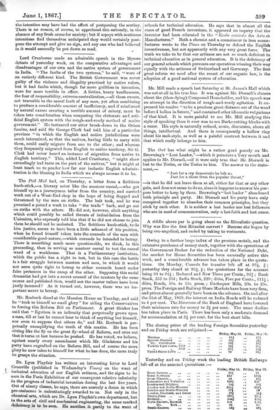Lord Cranborne made an admirable speech in the Mysore -debate
of yesterday week, on the comparative advantages and disadvantages of our own and the native system of government in India. "The faults of the two systems," he said, "were of an entirely different kind. The British Government was never guilty of the violence and illegality practised by native rulers, but it had faults which, though far more guiltless in intention, -were far more terrible in effect. A listless, heavy heedlessness, the fear of responsibility, extreme centralization,—all these causes, not traceable to the moral fault of any man, yet often combining to produce a considerable amount of inefficiency, and if reinforced by natural causes creating a terrible amount of misery, must be taken into consideration when comparing the elaborate and arti- ficial English system with the rough-and-ready method of native government." He instanced our utter break-down in the Orissa famine, and said Sir George Clerk had told him of a particular province "in which the English and native jurisdictions were much intermixed, so that the natives, having little to carry with them, could easily migrate from one to the other ; and whereas they frequently migrated from English to native territory, Sir G. Clerk had never heard an instance of migration from native to English territory." This, added Lord Cranborne, "might show -exceedingly bad taste on the part of the natives," but it might at least teach 111 to ponder how far our inelastic English adminis- tration is the blessing to India which we always assume it to be.






























 Previous page
Previous page